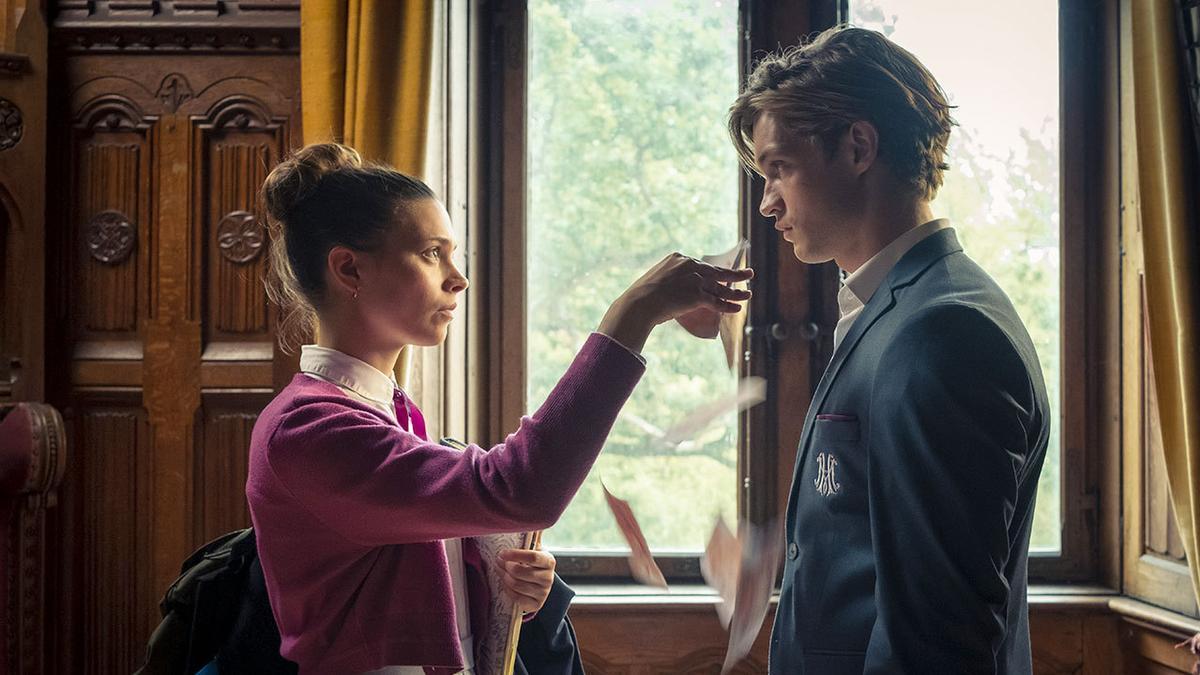
The online community is currently besotted with Maxton Hall — The World Between Us, an Amazon Original series that has captured the zeitgeist with its vivid portrayal of youth, ambition, and romance. At the heart of this fan fervor are two compelling characters: Ruby Bell, portrayed by Harriet Herbig-Matten, a determined scholarship student, and James Beaufort, played by Damian Hardung, an arrogant heir whose family exudes privilege and old money. The series, based on Mona Kasten’s enthralling book “Save Me,” is making waves for its dynamic narrative and emotional depth.
Maxton Hall’s initial episodes plunge viewers into a world of stark contrasts and sizzling tensions. It begins with a striking opening scene that highlights James Beaufort’s affluence and the myriad issues plaguing his family. Within the first fifteen minutes, the narrative whisks us away to a realm inhabited by a powerful elite who indulge in nefarious activities. In this setting, Ruby stands out as an embodiment of purity and diligence, shining bright against a backdrop of moral ambiguity.
The first spark between Ruby and James is anything but romantic — a charged moment brought about by the complicated affair of James’ sister, Lydia Beaufort, played by Sonja Weißer. A social clash catalyzes their complex relationship when James, in a display of hauteur, sends strippers to an event that Ruby meticulously organizes at Maxton Hall. This act of blatant disrespect ignites a fierce rivalry between the two, fueling a compelling storyline driven by Ruby’s fervent desire to excel and James’ brooding presence.
In executing the ‘enemies to lovers’ and ‘rich boy, poor girl’ tropes, Maxton Hall mirrors many a classic romance yet maintains freshness through its earnest depiction of youth navigating convoluted socio-economic landscapes. Despite predictability in plot devices, such as an overbearing family, tumultuous break-ups, searing jealousy, and inevitable patch-ups, the series successfully captures the audience’s attention. The heroes’ journey to self-discovery and mutual happiness, peppered with poignant moments, resonates deeply with viewers.
The first season crescendos into a dramatic cliffhanger, keeping audiences on the edge of their seats awaiting the subsequent season. Given that Kasten’s literary series includes “Save You” and “Save Us,” the anticipation is rife, as the series’ rich source material promises a continuity ripe for adaptation.
.
This narrative structure remains captivating due to its adept use of universally appealing tropes. The ‘rich boy, poor girl’ dynamic has perennial charm and mass appeal, drawing in a diverse audience with a magnetic vitality. Anyone familiar with the enchanting escapades of the Barbie universe might recognize a kinship with “Barbie: Princess Charm School.” By substituting the male lead with a kind-hearted Ken, the parallels become striking, revealing Maxton Hall’s wider thematic connections.
Likewise, the K-drama sensation “The Heirs” — a show that remains a fixture in binge-watch lists years after its premiere — explores similar themes. It interweaves the ‘rich boy, poor girl’ trope within Korea’s chaebol business culture, reflecting a global resonance. Even mainstream hits like the Hollywood blockbuster “Crazy Rich Asians” delve into these familiar motifs with a modern twist and a glitzy flair.
This fascination with the trope is also deeply ingrained in literary history. Literary enthusiasts can readily identify its echoes in classic literature. The brooding Byronic hero archetype, evolving into characters like Rochester in Charlotte Brontë’s “Jane Eyre,” exemplifies the rich and troubled male lead who becomes a focal point of romantic pursuit, despite daunting challenges — in Brontë’s case, the archetypal ‘madwoman in the attic.’
The enduring popularity of the ‘rich boy, poor girl’ theme, or its variations, seems to tap into fundamental human desires — the pursuit of success, the fulfillment of extraordinary dreams, the cathartic allure of a fairytale ending, and a profound yearning for improved social mobility. Maxton Hall’s success is a testament to these timeless themes, reflecting societal aspirations and the continuous magnetic pull of such narratives.
In conclusion, Maxton Hall — The World Between Us, with its engaging characters, dramatic rivalries, and heartfelt romance, underscores the perennial charm of familiar romantic tropes, contextualized within contemporary settings. As it rides the wave of popularity, this series exemplifies how traditional storytelling elements can be reinvigorated to captivate today’s viewers, ensuring the ‘rich boy, poor girl’ narrative remains ever relevant and compelling.












